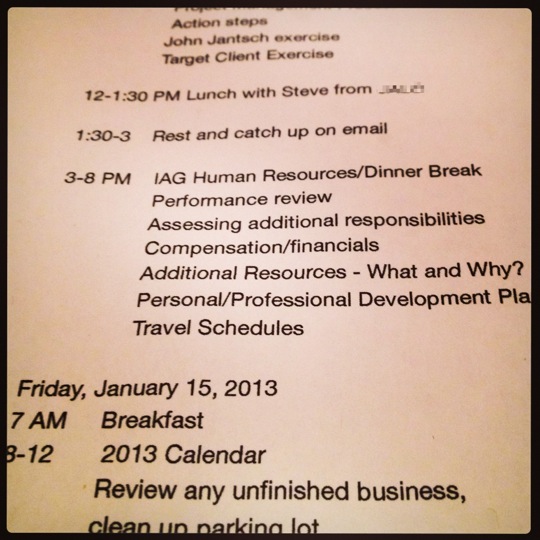We’re wrapping up our first company retreat Friday morning. It’s been the best thing we’ve done in our company since hiring Lynn.
We intentionally cleared our calendars and focused our massive, handsome brains toward working on our business instead of in it.
We looked at the last year and into the next, and we also came up with eleven tips to make your next retreat more invigorating and productive.
1. Have One – You think you’re just too busy to have a retreat? So does everyone. Schedule it. Make one of the goals of your retreat to analyze why you don’t think you have the time to have one.
2. Keep An Ongoing Agenda – You never know when inspiration is going to strike. Start a shared file somewhere immediately where people can add agenda items year-round as they think of them. If you’re a large company, you may want to choose to exclude some of them, but be sure to tell whomever includes it why you made your choice.
3. Chunks – Schedule related items in chunks with nice breaks in between. For example, in one chunk we talked strictly about clients – current, prospective, and what we think our ideal clients’ (and disaster clients’) personas would be. Another session was about HR, another was about our own marketing plan and its subtopics.
4. Breaks – Schedule healthy breaks for email checking and phone calls and decompressing and plain ole’ interstitial time for people to chat with each other.
5. Respect – During the chunks, keep your phones off and email closed. Respect the chunks and breaks.
6. Meals – Cater extensively. Go out together. Share long (scheduled) meals. Get the introverts out but then be sure to schedule time for them to recharge.
7. Roles – These jobs can rotate, but someone should take notes. Someone should make sure things keep moving. Someone should—SQUIRREL!
8. Parking Lot – Someone should mind the parking lot. When things start to veer off-topic, feel free to say “parking lot” (or call out the aforementioned rodent). Whoever’s minding the parking lot writes down (parks) the intruding topic for later discussion before the retreat ends.
9. Clean Up The Parking Lot – Make time at the end to address the squirrel topics. Are they worthy of this retreat? If not, schedule someone to do something with each one for follow-up.
10. Review – This is the most important part. What have you learned? What will you do differently as a result of this retreat?
11. Follow Through – No. Wait. This is the most important part. What are your action steps? What must be done?


Leave a Reply